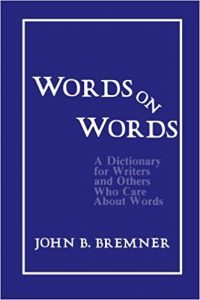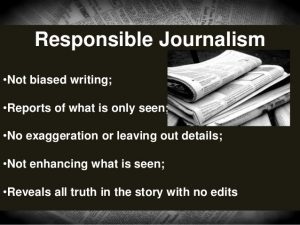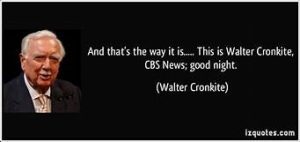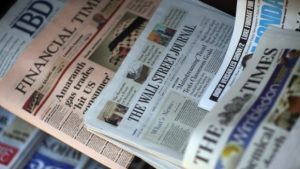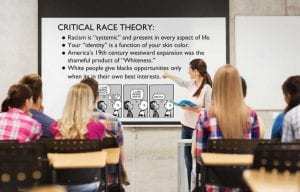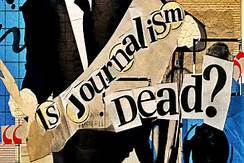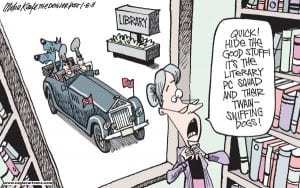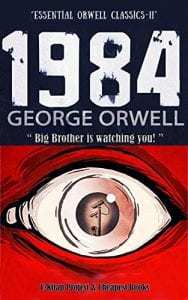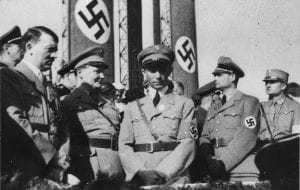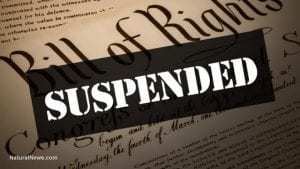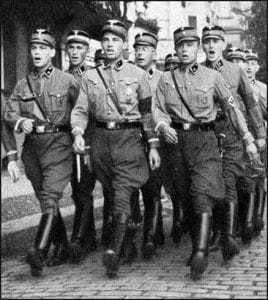Ronald E. Yates's Blog, page 49
July 29, 2021
Q & A with Novel PASTimes Part 1
 Currently, I am finishing a novel about foreign correspondents in Asia entitled: “Asia Hands” and I have outlined a prequel to my Finding Billy Battles Trilogy that focuses on Billy’s “shadow-riding” cousin, Charley Higgins, who skirted the law during most of his life, but who was one of Billy’s most loyal friends. After those two projects, I will probably spend time writing my own adventures as a foreign correspondent in Asia and Latin America. Are you a full-time writer or do you hold a day job? Writing is my day job. I have been a full-time writer since graduating from the University of Kansas and joining the Chicago Tribune in 1969. I have written thousands of newspaper, magazine, and opinion columns from more than 65 different countries. As a dean and professor at the University of Illinois, I wrote textbooks, newspaper columns, and articles in various magazines and journals.What is the biggest challenge/obstacle you face in protecting your writing time?The biggest obstacle in protecting my writing time is Southern California. The weather here is almost always beautiful and sunny. The fact that I live in the Southern California wine country just north of San Diego doesn’t help either. The temptation to get out of the house, go to the beach or enjoy a long leisurely lunch at one of the nearby wineries is sometimes too great to ignore.
Currently, I am finishing a novel about foreign correspondents in Asia entitled: “Asia Hands” and I have outlined a prequel to my Finding Billy Battles Trilogy that focuses on Billy’s “shadow-riding” cousin, Charley Higgins, who skirted the law during most of his life, but who was one of Billy’s most loyal friends. After those two projects, I will probably spend time writing my own adventures as a foreign correspondent in Asia and Latin America. Are you a full-time writer or do you hold a day job? Writing is my day job. I have been a full-time writer since graduating from the University of Kansas and joining the Chicago Tribune in 1969. I have written thousands of newspaper, magazine, and opinion columns from more than 65 different countries. As a dean and professor at the University of Illinois, I wrote textbooks, newspaper columns, and articles in various magazines and journals.What is the biggest challenge/obstacle you face in protecting your writing time?The biggest obstacle in protecting my writing time is Southern California. The weather here is almost always beautiful and sunny. The fact that I live in the Southern California wine country just north of San Diego doesn’t help either. The temptation to get out of the house, go to the beach or enjoy a long leisurely lunch at one of the nearby wineries is sometimes too great to ignore.
 What historical time periods interest you the most and how have you immersed yourself in a particular period or epoch?Growing up in rural Kansas I was always fascinated by the state’s 19th Century history. Kansas was a pivotal state before the Civil War because it entered the union as a free state and was populated–especially in the Northeast–by abolitionists. Kansas was a terminus for the Underground Railroad. After the Civil War, it became about as wild and violent as any state in the union. Cattle drives from Texas, wild cow towns, outlaws, legendary lawmen and fraudsters of every stripe gave the state a wicked reputation. At the same time, the 19th Century in America was a time of fantastic growth, invention, progress, and expansion. For some, such as Native Americans, this growth was not a pleasant experience, and in some cases, it was quite deadly. For others, the possibilities seemed limitless. Prosperity seemed restricted only by one’s determination and effort. Introduce us briefly to the main characters in your most recent book.
William Fitzroy Raglan Battles
is the main character in the book. His father is killed during the Civil War, so he is reared by his mother, Hannelore, a second-generation German-American woman who has to be both mother and father to her only son. It is a tall order, but Billy grows up correctly and is seemingly on the right path. His mother, a hardy and resilient woman, makes a decent living as a dressmaker in Lawrence, Kansas. An ardent believer in the value of a good education, she insists that Billy attend the newly minted University of Kansas in Lawrence. She is a powerful influence in his life, as are several other people he meets along the way. There is Luther Longley, an African-American former army scout who Billy and his mother meet at Ft. Dodge in 1866. He escorts them the 300 miles to Lawrence and winds up being a close friend to both Billy and his mother. There is Horace Hawes, publisher and editor of the Lawrence Union newspaper who takes Billy with him to start a new paper in Dodge City. There is Ben Minot, a typesetter and former Northern Army Sharpshooter, who still carries a mini ball in his body from the war and a load of antipathy toward The Confederacy. There is Signore DiFranco, the Italian political exile Billy meets in Dodge City. There is Mallie McNab, the girl Billy meets falls in love with, marries, and with whom he hopes to live out his life. There is the afore-mentioned Charley Higgins, Billy’s first cousin, who sometimes treads just south of the law, but who is also Billy’s most devoted compañero de Armas. Then there is the Bledsoe family– notably Nate Bledsoe, who blames Billy for the deaths of his mother and brother and who swears vengeance. Book one of the trilogy ends with Billy meeting the widow Katharina von Schreiber, a mysterious baroness who in Book #2 propels Billy into a series of misadventures and dubious situations. What drew you to write this story?I was intrigued with the idea of a 19th Century Kansas boy forced to deal with a string of tragedies and misadventures who eventually makes his way to the Far East in search of himself. How would he handle himself in such strange places as French Indochina, the Spanish-controlled Philippines, Hong Kong, Singapore, etc.?
What historical time periods interest you the most and how have you immersed yourself in a particular period or epoch?Growing up in rural Kansas I was always fascinated by the state’s 19th Century history. Kansas was a pivotal state before the Civil War because it entered the union as a free state and was populated–especially in the Northeast–by abolitionists. Kansas was a terminus for the Underground Railroad. After the Civil War, it became about as wild and violent as any state in the union. Cattle drives from Texas, wild cow towns, outlaws, legendary lawmen and fraudsters of every stripe gave the state a wicked reputation. At the same time, the 19th Century in America was a time of fantastic growth, invention, progress, and expansion. For some, such as Native Americans, this growth was not a pleasant experience, and in some cases, it was quite deadly. For others, the possibilities seemed limitless. Prosperity seemed restricted only by one’s determination and effort. Introduce us briefly to the main characters in your most recent book.
William Fitzroy Raglan Battles
is the main character in the book. His father is killed during the Civil War, so he is reared by his mother, Hannelore, a second-generation German-American woman who has to be both mother and father to her only son. It is a tall order, but Billy grows up correctly and is seemingly on the right path. His mother, a hardy and resilient woman, makes a decent living as a dressmaker in Lawrence, Kansas. An ardent believer in the value of a good education, she insists that Billy attend the newly minted University of Kansas in Lawrence. She is a powerful influence in his life, as are several other people he meets along the way. There is Luther Longley, an African-American former army scout who Billy and his mother meet at Ft. Dodge in 1866. He escorts them the 300 miles to Lawrence and winds up being a close friend to both Billy and his mother. There is Horace Hawes, publisher and editor of the Lawrence Union newspaper who takes Billy with him to start a new paper in Dodge City. There is Ben Minot, a typesetter and former Northern Army Sharpshooter, who still carries a mini ball in his body from the war and a load of antipathy toward The Confederacy. There is Signore DiFranco, the Italian political exile Billy meets in Dodge City. There is Mallie McNab, the girl Billy meets falls in love with, marries, and with whom he hopes to live out his life. There is the afore-mentioned Charley Higgins, Billy’s first cousin, who sometimes treads just south of the law, but who is also Billy’s most devoted compañero de Armas. Then there is the Bledsoe family– notably Nate Bledsoe, who blames Billy for the deaths of his mother and brother and who swears vengeance. Book one of the trilogy ends with Billy meeting the widow Katharina von Schreiber, a mysterious baroness who in Book #2 propels Billy into a series of misadventures and dubious situations. What drew you to write this story?I was intrigued with the idea of a 19th Century Kansas boy forced to deal with a string of tragedies and misadventures who eventually makes his way to the Far East in search of himself. How would he handle himself in such strange places as French Indochina, the Spanish-controlled Philippines, Hong Kong, Singapore, etc.?
 I spent most of my career as a foreign correspondent in Asia, and I often wondered what it would have been like to have been in that part of the world in the 19th Century. This book gives me (and my readers) an opportunity to find out. Tell us a bit about Book #3 in the trilogy.“The Lost Years of Billy Battles” picks up Billy’s life in 1914 in Chicago where he is working as an assistant managing editor for a newspaper and enjoying a rather sedate life. Then, one morning the telephone rings, and Billy is suddenly thrust back into a life of peril and adventure in Mexico during its revolution, and as the world is on the verge of World War I. In places like Veracruz, Billy comes into conflict with German spies and a passel of shady characters. Later he meets up with some old friends from his days in Kansas, joins the U.S. Army’s hunt for Pancho Villa, and eventually winds up back in French Indochina and the Philippines. Events conspire to embroil him in a variety of disputes, conflicts, and struggles–events with which a Kansas sand cutter is hardly equipped to deal. How will he do? You will have to read Book #3 to find out! A reader once asked me this question, and I thought it was a good one. Is there ever a time when you feel like your work is truly finished and complete?I don’t know if that ever happens. I do know that at some point, YOU MUST LET IT GO! Writing a book is a bit like rearing a child. Eventually, after you have imbued the child with as much of your worldly experience and wisdom as he or she can grasp and absorb you have to allow your creation to encounter the world. It’s the same with books. Writers can fiddle with plots, characters, endings, and beginnings ad nauseam and never feel the book is ever finished. My advice. JUST FINISH THE DAMNED BOOK! Get over it and get the book out into the public domain. Readers will let you know if you have finished the book–and if they like it. If you could be a character from your favorite historical novel, who would you be?Woodrow Call from Lonesome Dove OR John Blackthorne from Shogun.
I spent most of my career as a foreign correspondent in Asia, and I often wondered what it would have been like to have been in that part of the world in the 19th Century. This book gives me (and my readers) an opportunity to find out. Tell us a bit about Book #3 in the trilogy.“The Lost Years of Billy Battles” picks up Billy’s life in 1914 in Chicago where he is working as an assistant managing editor for a newspaper and enjoying a rather sedate life. Then, one morning the telephone rings, and Billy is suddenly thrust back into a life of peril and adventure in Mexico during its revolution, and as the world is on the verge of World War I. In places like Veracruz, Billy comes into conflict with German spies and a passel of shady characters. Later he meets up with some old friends from his days in Kansas, joins the U.S. Army’s hunt for Pancho Villa, and eventually winds up back in French Indochina and the Philippines. Events conspire to embroil him in a variety of disputes, conflicts, and struggles–events with which a Kansas sand cutter is hardly equipped to deal. How will he do? You will have to read Book #3 to find out! A reader once asked me this question, and I thought it was a good one. Is there ever a time when you feel like your work is truly finished and complete?I don’t know if that ever happens. I do know that at some point, YOU MUST LET IT GO! Writing a book is a bit like rearing a child. Eventually, after you have imbued the child with as much of your worldly experience and wisdom as he or she can grasp and absorb you have to allow your creation to encounter the world. It’s the same with books. Writers can fiddle with plots, characters, endings, and beginnings ad nauseam and never feel the book is ever finished. My advice. JUST FINISH THE DAMNED BOOK! Get over it and get the book out into the public domain. Readers will let you know if you have finished the book–and if they like it. If you could be a character from your favorite historical novel, who would you be?Woodrow Call from Lonesome Dove OR John Blackthorne from Shogun.
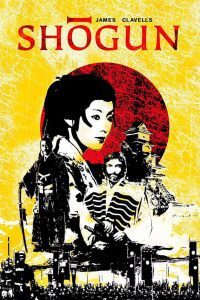 What is the most significant misconception the general public has about authors?I don’t know if those who do not write for a living understand just how difficult writing is. Many believe that writers work from inspiration and that the words merely leap onto the page (or into the computer). In fact, while inspiration is a beautiful thing, it is not what makes a good writer or book. Writing requires significant research, whether fiction or non-fiction. It needs a facility for organization and a keen sense of plot, pacing, and story. I don’t believe writers are “born.” They evolve as a result of significant experience in the craft. Finally, not all writers are brooding, intractable alcoholics or unbearable misanthropes who feel their creations contain irrevocable and definitive truths that most of humanity is too stupid to comprehend. In fact, most successful writers are excellent storytellers, and they like nothing more than to have their stories read by as many people as possible–even if those stories don’t always possess immutable truths. Ernest Hemingway once said: “Hell, there’s nothing hard about writing. You just sit at your typewriter and bleed.” END OF PART ONE. READ PART TWO TOMORROW
What is the most significant misconception the general public has about authors?I don’t know if those who do not write for a living understand just how difficult writing is. Many believe that writers work from inspiration and that the words merely leap onto the page (or into the computer). In fact, while inspiration is a beautiful thing, it is not what makes a good writer or book. Writing requires significant research, whether fiction or non-fiction. It needs a facility for organization and a keen sense of plot, pacing, and story. I don’t believe writers are “born.” They evolve as a result of significant experience in the craft. Finally, not all writers are brooding, intractable alcoholics or unbearable misanthropes who feel their creations contain irrevocable and definitive truths that most of humanity is too stupid to comprehend. In fact, most successful writers are excellent storytellers, and they like nothing more than to have their stories read by as many people as possible–even if those stories don’t always possess immutable truths. Ernest Hemingway once said: “Hell, there’s nothing hard about writing. You just sit at your typewriter and bleed.” END OF PART ONE. READ PART TWO TOMORROW
July 27, 2021
An Uncommon Love of Words & Writing
This is a re-post of a blog post I did a while back. It is one of those timeless pieces about a one-of-a-kind journalism professor and his love of words and writing. Take a look. I bet you will find it fascinating and helpful. In any case, I hope you enjoy it.
A while back a friend sent me an excellent column about a professor at my alma mater: the William Allen White School of Journalism at the University of Kansas.
The professor’s name was John Bremner, a native of Australia and ordained Catholic priest who left the priesthood to become a journalist. (“Proof that purgatory exists,” he once told me.)
While I never had the late Professor Bremner (he died in 1987) for a class, he made his presence known in the newsroom of the University Daily Kansan where I was the editor-in-chief. He often would stick his head in the door of my office and say something like: “Good paper today, Ron.”
Those were the days I liked. But all too often I heard things like:
“The lead story on page one makes about as much sense as a wallaby giving a sermon,” which was Prof. Bremner’s way of saying it made no sense at all!
Professor Bremner was a stickler for the proper use of the English language. He could get especially cranky when people who make their livings using it every day, such as journalists, misused the lingua franca.
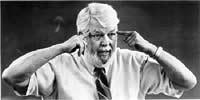 Prof. John Bremner
Prof. John BremnerIn the introduction of his seminal book “Words on Words,” published in 1980, John Bremner had this to say about language:
“Words are my professional life. It was nurtured by the study of classical and modern languages, which was part of the characteristic education of my generation, at least in my native Australia. Unfortunately, such education has become uncharacteristic, especially in the United States. I have witnessed the steady growth of literary ignorance during a career of more than a third of a century as a professional journalist, a professor of journalism and a newspaper consultant.”
He goes on to say: “Many of my students arrive in my writing and editing classes…with an almost total ignorance of English grammar and usage and only a smattering of any foreign language.”
Those words were probably written in the late 1970s. Believe me, as someone who was until recently a professor at a major university; things have not gotten any better. If anything, they have gotten worse. Sadly, many of my students at the University of Illinois between 1997 and 2010 wrote the English language with the adroitness of a heavy truncheon rather than with the precision of a sharp pen.
During a 1984 seminar for newspaper editors, Bremner told the crowd:
”Jesus Christ once said, ‘Where two or three are gathered together. .’.But he couldn’t have said precisely that. He didn’t speak English. And why would he have said ‘gathered together’? When you have ‘gathered,’ you don’t need ‘together.’ ”
Not even the Bible was safe from Professor Bremner’s reproach.
In 1952 Bremner earned a master’s degree in journalism from Columbia University in New York. When his Columbia class was honored by the journalism school’s alumni association in 1987 for having endowed a scholarship, Professor Bremner was chosen to accept the award. In his acceptance speech, he pointed out all the errors in spelling, syntax, and grammar in the class newsletter. Classic Bremner.
To say John Bremner was an academic legend during his tenure at the University of Kansas is to do him a great disservice. He was an etymological doyen; a philological force; a grammatical guru.
He would have hated that description because he always cautioned me to avoid alliteration whenever possible. “It’s sophomoric,” he once told me. “Unless it is used by a connoisseur.”
Here is the column mentioned above published by Steve Wilson, Executive Editor, of The Paducah (KY) Sun. I hope you will enjoy it, but most of all, be prepared to learn something about words and writing.
———————————————————————————————————————————————————————-
An uncommon love of words
By Steve Wilson
Executive Editor, the Paducah Sun
On a local TV newscast a few days ago, the sports anchor said St. Louis Cardinals’ catcher Yadier Molina had received “the lion’s share of votes” and would be a starter in this summer’s all-star game.
His use of “lion’s share” seemed dubious and sent me back to a favorite book called Words on Words. It’s written by the late John Bremner, an exuberant college professor who was obsessed with the proper use of the English language.
As expected, he had an entry for “lion’s share” that didn’t square with the usage on TV.
“If you use this cliche, know its proper meaning. In one version of the fable, Aesop’s lion got all the meat except a few scraps snatched by the fox. In the other versions, the lion got it all. Properly, the lion’s share means all or almost all of something, not merely a majority.”
Bremner was a charismatic figure – 6-foot-5, 260-pounds, white-bearded, a native Australian who spent the biggest part of his career teaching journalism at the University of Kansas. He also put on seminars for newspaper editors around the country, which is how we met and became friends.
He was an animated instructor, pacing the room, digressing to tell a story about British history one moment, then raging about the confusion caused by a misplaced comma the next. More than once he had thrown open a window in his classroom, waved his white handkerchief, and shouted, “Help, I’m being held captive by a roomful of idiots.”
Such theatrics, he said, were less about ego than connecting with the audience.
“You don’t hold students and professionals by simply filling them with facts and snippets of knowledge. You have to keep them interested, keep them alert.”
He enjoyed pointing out the illogic of many word usages.
“You want the word couple to be singular?” he asked. “All right, the couple was married yesterday. It went to Florida on its honeymoon. OK so far. But it had an argument. So it decided to get a divorce. And it went its separate ways.”
His book is a pleasure to peruse:
Advance planning – Have you planned backward lately?
At the present time – Now.
At this point in time – Now.
Better part of – “She stayed for the better part of an hour” means she stayed for more than a half-hour. Why better? Are the first 30 minutes better than the last 30? Make it “most of the hour.”
Chair – Keep it a noun. What’s wrong with “Smith presided at the meeting” or “Smith was the chairman”? Pretty soon we’ll be saying Smith “podiumed the orchestra” or “pulpited the church.” Some fingers need to be kept in the verbal dikes.
Facilitate – A windy word for “make easier, aid, assist, help.”
Goes without saying – So why say it?
Irregardless – Regardless of the school of “a word is a word if people utilize it,” there is no such word as irregardless.
Precipitate/Precipitous – Though both adjectives derive from the same root (Latin praeceps, headlong), precipitate means excessively hasty and refers to actions, whereas precipitous means extremely steep and refers to physical objects. The bishop who counseled against “precipitous marriage” either was ignorant of the distinction or was jumping to the conclusion that rash decisions lead to rocky adventure.
Split infinitive – Splitting an infinitive means inserting one or more words between the to and the verb, as in “to thoroughly appreciate.” Banning the split infinitive is ridiculous. The so-called rule has no foundation in logic, rhetoric or common sense. Go ahead and split. Let euphony be your guide. Never to split is to seriously stifle.
Toward/Towards – Most authorities consider toward American and towards British. But a case can be made for towards in American usage when the following word begins with a vowel sound. There is sibilant smoothness in “towards evening.”
Ugly scar – Don’t say, “He has an ugly scar on his face.” Drop ugly. Ugliness is in the eye of the beholder. Don’t force the reader to subscribe to your sensitivities.
For all his wit and wisdom about editing, one of the most memorable moments of our seminar came at the end when Bremner said he wanted to share a poem by John Ciardi.
He first explained that a widgeon is a duck, a wicopy is a tree and widgeons do not roost in trees. When the editors gave him quizzical looks, he smiled and proceeded to recite the lines from memory:
A widgeon in a wicopy
In which no widgeon ought to be,
A widowed widgeon was.
While in a willow wickiup
A Wichita sat down to sup
With other Wichitas,
And what they whittled as they ate
Included what had been of late
A widgeon’s wing.
‘Twas thus
The widgeon in the wicopy,
In which no widgeon ought to be,
A widowed widgeon was.
When he finished, he told the group in a soft-spoken voice, “If you don’t like that, get out of this business.”
Bremner devoted his life to the best use of words. A tender, alliterative arrangement could make his day.
July 24, 2021
Some Thoughts About Today’s News Media
The other day, I had a long conversation about the state of American journalism with a couple of friends. They told me, in no uncertain terms, that they don’t believe anything they hear, read, or see when it comes to the news today. “It’s all propaganda and what isn’t propaganda is usually biased and inaccurate,” one of my friends said. “What the hell happened, Ron? You were a journalist once. What’s going on?”
I have to admit; I am ashamed at the kind of journalism I see being committed today. My friend is right. News–especially news emanating from cable TV (and I use the word “news” advisedly)–is slathered in a thick coat of disinformation, indoctrination, and misinformation, otherwise known as propaganda.
The kind of reporting, if you want to call it that, that I see, hear, and read today is all too often filled with the reporter’s biases and political opinion. I would have been run out of the Chicago Tribune newsroom, where I started my career in the early 1970s if I had written the kind of partisan and dishonest stories I see today.
Eventually, our conversation turned to other topics, such as the Coronavirus. Once again, my friends argued that the media are fanning the flames of panic by reporting stories that are filled with inaccuracies.
Finally, I suggested that my friends read a commentary on the state of America’s news media that I wrote on my blog a while back. Here it is again for those of you who might have missed it. I hope it provides a few answers to some of the questions you may have about the news media. Read on.
Good journalism, somebody once said, is a nation talking to itself.
That’s “talking to itself,” not yelling, screaming, shrieking, talking over one another, and engaging in verbal bullying.
That is just about all we see on prime-time television–especially cable television–these days.
Primetime cable TV outlets such as Fox, CNN, MSNBC, CNBC, etc. continue to produce a proliferation of hosts and pundits with no foundation in journalistic ethics and tradition. Today’s so-called “news shows” more often than not degenerate into shoutfests where guests and hosts engage, not in any intelligent discussion of issues, but in contests to see who can talk the loudest or bully those who disagree with them into submission.
That kind of “squawk talk” comes with a steep price. What does the viewing public learn from such exhibitions of bad behavior?
The answer, I would argue, is not much. Because when people are yelling at one another, calling one another names or behaving like petulant children, reasoned discourse disappears, and the viewer gets lost in the shrill verbal brawl of the moment. I believe we have lost the art of reasonable discourse in this country. If you don’t agree with someone, then just talk or shout over them, call them names, make faces and behave like a two-year-old. (Sorry if I have insulted any two-year-olds).
Opinion is NOT reporting. Yet those who monitor the recent explosion of misnamed “news shows” say viewers don’t discern between shows with distinct political agendas and those that attempt to present events with a minimum of subjectivity and a maximum of fairness and balance.
When I started in the newspaper business, reporters were taught that while all of us have biases, as professionals, we must work to subordinate those prejudices and keep our opinions out of the stories we report.
It was something that was drilled into our heads, and sound editors and producers made sure it never left.
That is just not the case today. Too many journalists (or those who like to call themselves journalists) feel compelled to insert their opinions in everything they write or produce. The “new” journalism of assertion and vilification has displaced the old journalism of verification. Gossip has become news, fiction is now fact, and biases are a part of straight news reporting.
Many of these “journalists” are not journalists at all, but merely former political operatives and talking heads who wrap themselves in the mantle of journalism when real journalists are risking their lives in places like Afghanistan, Syria, and Iraq to bring people reliable news.
The opinion-fueled shows that dominate cable news channels during prime time are far removed from the old-school straight news programs such as the traditional nightly network newscasts with which many of us grew up.
At an awards dinner several years ago in New York for the late Mike Wallace of CBS 60-Minutes fame, I had an opportunity to talk with Walter Cronkite about the state of television news in general and prime-time cable news in particular. During his reign on CBS, Cronkite, who died in 2009, was often referred to as the most trusted journalist in America–an appellation he didn’t take lightly. He was commonly referred to as “Uncle Walter.”
During our conversation, he decried the lack of ethics and professionalism that is so pervasive in newsrooms today.
“Too many of these people simply don’t care about or have any desire to ferret out the truth,” Cronkite told me. “Too many have intense political or social agendas, and rather than present information as objectively as possible, they want to jam their opinions down our throats.”
And, he added, most of the public cannot distinguish between these faux journalists and real reporters.
The Society of Professional Journalists–an organization I have belonged to since my days as a student at the University of Kansas–has a code of ethics of which most of cable TV’s shouting heads have no concept.
I, as well as a majority of the journalists I have worked within the U.S. and around the world, always worked assiduously to follow that code, which consists of several sections.
The ones that stand out most in these days of ersatz journalism (and which are, unfortunately, too often ignored) are:
Give voice to the voiceless; official and unofficial sources of information can be equally valid.Distinguish between advocacy and news reporting. Analysis and commentary should be labeled and not misrepresent fact or context.Test the accuracy of information from all sources and exercise care to avoid inadvertent error. Deliberate distortion is never permissible.Journalists should be free of obligation to any interest other than the public’s right to know.Support the open exchange of views, even views they find repugnant.Journalists are accountable to their readers, listeners, viewers, and each other.I have purposely NOT mentioned any names of the most egregious offenders here because that would require several more pages of copy. But I urge you to watch these so-called “news shows” with a critical eye and ear from now on.
Pay attention to who they have on as guests or as experts–and how often they appear. Watch how those with opposing views are interviewed–or not interviewed. Are they allowed to get their points or arguments across without being shouted down?
What kinds of discussions are held on issues? Are they truth-seeking or attempts merely to reinforce the opinion of the host?
Does each member of a panel have an opportunity to talk without being insulted by the host or by some other panel member?
How you answer these questions will go a long way in helping you to determine if you are watching a frenzied opinion-fest or a real news show designed to get at the truth.
As Thomas Jefferson once said: “An informed citizenry is the only true repository of the public will.”
So, I will end where I began.
Good journalism is a nation talking to itself–and, I would add, it is a nation that learns from intelligent, rational discourse and has at its core the responsibility to help advance and encourage an informed citizenry.
July 23, 2021
The American Descent into Madness
Today, I am sharing my blog with historian Victor Davis Hanson, a distinguished fellow of the Center for American Greatness as well as Stanford University’s Hoover Institution.
In his commentary, Prof. Hanson asks the following compelling question: America went from the freest country in the world in December 2019 to a repressive and frightening place by July 2021. How did that happen?
It’s a question I suspect a lot of us would like to have answered. Take a look at Prof. Hanson’s answer.
The American Descent into Madness
By Victor Davis Hanson
Nations have often gone mad in a matter of months. The French abandoned their supposedly idealistic revolutionary project and turned it into a monstrous hell for a year between July 1793 and 1794. After the election of November 1860, in a matter of weeks, Americans went from thinking secession was taboo to visions of killing the greatest number of their fellow citizens on both sides of the Mason-Dixon line. Mao’s China went from a failed communist state to the ninth circle of Dante’s Inferno, when he unleashed the Cultural Revolution in 1966.
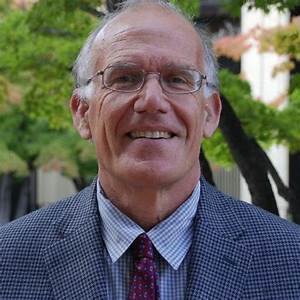 Victor Davis Hanson
Victor Davis HansonIn the last six months, we have seen absurdities never quite witnessed in modern America. Madness, not politics, defines it. There are three characteristics of all these upheavals. One, the events are unsustainable. They will either cease or they will destroy the nation, at least as we know it. Two, the law has largely been rendered meaningless. Three, left-wing political agendas justify any means necessary to achieve them.
Citizenship as Mere Residency
Two million people are anticipated to cross the southern border, en masse and illegally, over a 12-month period. If that absurdity were to continue, we would be adding the equivalent of a major U.S. city every year. The new arrivals have three things in common: Their first act was to break U.S. law by entering the country. Their second was to break the law by residing here illegally. And their third will be to find false identification or other illegal means to continue breaking the law. One does not arrive as a guest in a foreign country and immediately violate the laws of his host—unless one holds those laws in contempt.
Arrivals now cross a border that had been virtually closed to illegal immigration by January 2021. In the cynical and immoral logic of illegal immigration (that cares little for the concerns either of would-be legal immigrants or U.S. citizens), arrivals will be dependent upon the state and thus become constituents of progressives who engineered their arrival.
Yet the issue is not illegal immigration per se. If protests were to continue in Cuba, and 1 million Cubans boated to Miami, the Biden Administration would stop the influx, in terror that so many anti-Communists might tip Florida red forever.
How strange that the U.S. government is considering going door-to-door to bully the unvaccinated, even as it ignores the daily influx of thousands from Mexico and Latin America, without worrying whether they are carrying or vaccinated for COVID-19. Meanwhile, the progressive media shrilly warns that the new Delta Variant of the virus is exploding south of the border. Note how the administration applies standards to its own citizens that it does not apply to foreign nationals illegally entering the country.
Crime as Construct
Crime is another current absurdity. There exists a mini-industry of internet videos depicting young people, disproportionately African American males, stealing luxury goods from Nieman-Marcus in San Francisco, clearing a shelf from a Walgreens with impunity, or assaulting Asian Americans. These iconic moments may be unrepresentative of reality, but given the mass transfers and retirements of police, and the frightening statistics of large increases in violent crime in certain cities, the popular conception is now entrenched that it is dangerous to walk in our major metropolises, either by day or at night. Chicago has turned into Tombstone or Dodge City in the popular imagination.
Scarier still is the realization that if one is robbed, assaulted, or finds one’s car vandalized, it is near certain the miscreant will never be held to account. Either the police have pulled back and find arrests of criminals a lose-lose situation, or radical big-city district attorneys see the law as a critical legal theory construct, and thus will not enforce it. Or the criminal will be arrested and released within hours.
So a subculture has developed among Americans, of passing information about where in the country it is safe, where it is not, and where one can go, where one cannot. This is clearly not America, but something bizarre out of Sao Paulo, Durban, or Caracas.
The Campus Con
The universities over the past 40 years were intolerant, hard Left, and increasingly anti-constitutional. But they also fostered a golden-goose confidence scheme that administrators dared not injure, given the precious eggs of federally guaranteed student loans that ensured zero academic accountability and sent tuition costs into the stratosphere. There was an unquestioned supposition that a degree of any sort, of any major, was the ticket to American success. In cynical fashion, we shrugged that most prestigious institutions were little more than cattle branders that stamped graduates with imprints that gave them unearned privilege for life.
Yet universities now have both hands around their golden goose’s neck and are determined to strangle it. The public is becoming repulsed at the woke McCarthyite culture on campus, and will be more turned off when campuses open in the fall in 2019-style. At the Ivy League or major state university campuses, admissions are no longer based on proportional representation in the context of affirmative action, but are defined increasingly by a reparatory character.
Grades, test scores, and “activities” of the white and Asian male college applicants are growing less relevant. Only “privileged” white males with sports skills, connections, or families who give lots of money are exempt from the new racial reparation quotas. The new woke admission policy ironically is targeting the liberal suburban professional family, the Left’s constituency, whose lives are so fixated on whether children graduate from Yale, Princeton, Harvard, Stanford, or like campuses.
Given the radical change in incoming student profiles, the faculty increasingly will have to choose between accusations of racism, or grading regardless of actual performance, given thousands of new enrollees do not meet the entrance standards of just two or three years ago. Remember that since wokeism was always a top-down elite industry, minority progressives still will fight it out with white leftists in intramural scraps over titles, salaries, and managerial posts.
The public has had enough. For the first time, people will ask why are we subsidizing student loans, why are multibillion-dollar endowments not taxed, and why do we think a B.A. in sociology or psychology or gender studies is an “investment” that prepares anyone for anything?
Commissars and Jacobins
The critical race theory craze is reaching peak woke, or is already on the downslope. No complex and sophisticated society is sustainable with a Maoist creed of cannibalizing citizens for thought crimes. Commissars do not produce anything or serve anybody, but only monitor thoughts and speech to ascertain the purity of diversity, equity, and inclusion. They are not just a drain on the productive sector but will insidiously destroy it, since their currency is to ensure a timid, obsequiousness and banal orthodoxy.
We know from the failed Soviet system and from the French Revolution that the most mediocre in society became its most eager auditors of correct behavior. The arbiters of proper thought—the self-righteous paid toady, the perpetual victim employed in service to government payback, the freelancing snitch—were always the villains of freedom, productivity, and humanity, whether we read of the killing off of Alexander the Great’s inner circle, the forced suicides of the Neronian circle, the Jacobin murder spree, or the nightmarish world described by Aleksandr Solzhenitsyn.
That the Biden Administration has now joined with Silicon Valley to hunt down on social media any dissenters from this month’s official policy on vaccinations and mask-wearing was not so shocking as to be expected from a media that banned coverage of Hunter Biden’s laptop. In Cuban-fashion, millions of judge-jury-executioner online snitches, with government encouragement, will help root out incorrect thoughts at light speed.
Inflation Is a Mere Construct
We used to know what inflation was, its pernicious role in past civilizations, and how to combat it. The danger of worthless currency is a staple of classical literature from Aristophanes to Procopius. The scary fact is not just that we are destroying the value of our money—the exploding price of gas, food, appliances, lumber, power, and housing are overwhelming even Joe Biden’s entitlement machine—but that we are constructing pseudoeconomics to justify the nihilism.
Right now, we witness a multitrillion-dollar fight over borrowing beyond our $30 trillion debt to build “infrastructure,” a word that has been expanded to include mostly anything but roads and bridges. What exactly is so liberal about the farmworker paying $5 a gallon for gas to commute to the fields, the small contractor doing a remodeling job with plywood at $80 a sheet, or the young couple whose loan qualification is always a month behind the soaring price of a new home?
Our People’s Military
Americans during this entire descent in madness sighed, “Well, at least there is the military left.” By that, I think they meant John Brennan had all but wrecked the CIA, while James Comey, Andrew McCabe, Kevin Clinesmith, Peter Strzok, and Lisa Page, et al. had weaponized the FBI. But the military was still a bastion of traditional, nonpartisan service, whose prime directive was to defend the country, win any war it was ordered to fight, and to maintain deterrence against opportunistic enemies. It was not envisioned as a “people’s army.” It was not a revolutionary Napoleonic “nation in arms.” And it was not a “liberation army.” The Constitution, 233 years of tradition, and the Uniform Code of Military Justice all reassured America of its wonderful defense forces.
And now? We are in the process of a massive reeducation and indoctrination campaign. The revamping not only draws scarce resources away from military readiness, but targets, without evidence, the white working class, and defames it as insurrectionary—the very same cohort that disproportionately died in Afghanistan and Iraq.
If only General Mark Milley, chairman of the Joint Chiefs of Staff, and Admiral Michael Gilday, chief of naval operations, had been as animated, as combative, and as fired up in congressional testimony about winning in Afghanistan or deterring the Chinese in the waters off Taiwan as they were in defense of their recommended lists of Marxist-inspired critical race theory texts!
One purpose of the Uniform Code of Military Justice was not to prevent retired top brass from attacking beloved presidents, or even blasé ones. Its aim was to remind the country that it is the business of civilians, not pensioned retired military subject to recall in times of crisis, to galvanize opinion against loudmouth unpopular presidents like Harry Truman, Richard Nixon, or Donald Trump.
The reason why the “revolving door” became a bipartisan worry was that four-star officers had mastered the navigation of Pentagon procurement. They possessed a rare skill easily—and hugely—monetized upon retirement, and thus its use was to be discouraged wholeheartedly.
And now?
The code is a mere construct. The revolving door is an advertisement for advancing to high rank. Policing the thoughts of American soldiers is apparently more important than fathoming the minds of our enemies on the battlefield.
Keep Cuba Castroite?
What was so hard about understanding that Cuba since 1959 has been a Communist gulag, antithetical to human freedom and consensual government? What was so difficult about conceding that Cuba had been an ally of the nuclear Soviet Union, always egging it on to war against the United States?
Yet here we are with protestors against a failed, evil state in the streets of Havana, and our own government, media, and professional classes are worried that ossified Communism in Cuba may fall.
After opening the U.S. southern border to pseudo-political refugees, the Biden Administration is terrified that thousands of real ones might come to Miami in the fashion it invited millions to storm into Texas. The Biden Administration, and the Left in general, finally revealed what many of us have known: it had no real ideological view on illegal immigration. Its immigration policy was entirely utilitarian and hinged only on whether illegal immigration altered the demography of the electorate in the correct way.
The United Nations Über Alles
Finally, almost all Americans used to agree that the U.S. Constitution was unique and guaranteed personal freedom in a way the United Nations charter could not. Dozens of fascist, Communist, totalitarian, and authoritarian regimes, usually the majority of governments on earth, ensured that any General Assembly or U.N. committee ruling would parrot the views of its illiberal and corrupt members.
Not anymore. Biden’s secretary of state, Antony Blinken, has invited in the U.N. to assess whether the United States meets global standards of justice or, in fact, is racist and in need of global censure: “I urge all U.N. member states to join the United States in this effort, and confront the scourge of racism, racial discrimination, and xenophobia,” he said last week.
That is like asking Libya in 2001 to assess whether our airline pilot training met proper standards or having China adjudicate the conditions in U.S. prisons.
America went from the freest country in the world in December 2019 to a repressive, and frightening place by July 2021. It went not so much hard-Left, as stark-raving mad.
That abrupt descent, too, is not workable and millions will collectively decide they have no choice but to push back and conclude, “In the 233rd year of our republic, we tens of millions are not going to cede freedom of thought and expression to thousands of Maoists. Sorry, no can do.”
About Victor Davis Hanson
Victor Davis Hanson is a distinguished fellow of the Center for American Greatness and the Martin and Illie Anderson Senior Fellow at Stanford University’s Hoover Institution. He is an American military historian, columnist, former classics professor, and scholar of ancient warfare. He has been a visiting professor at Hillsdale College since 2004. Hanson was awarded the National Humanities Medal in 2007 by President George W. Bush. Hanson is also a farmer (growing raisin grapes on a family farm in Selma, California) and a critic of social trends related to farming and agrarianism. He is the author most recently of The Second World Wars: How the First Global Conflict Was Fought and Won and The Case for Trump.
July 21, 2021
11 Skills Your Great-Grandparents Had That You Don’t
Those who write historical fiction are always striving to make sure our characters are part of the period in which our novels are set. A farmer in 19th Century Kansas, for example, had to know how to hunt and fish, how to forage and how to butcher livestock, pluck chickens, and shoe a horse, etc.
There were no supermarkets, no computers or online shopping, no clothing stores or malls. There were Sears and Montgomery Ward catalogs where women could order ready-made dresses and men could order pants and shirts, but ordering from them was considered an infrequent luxury.
 Your great-grandparents didn’t buy butter; they churned it!A while back, I received an e-mail from Ancestry.com, the online genealogy service that asked: “How old school are you? Do you think you’ve got what it takes to live in your great-grandparents’ era?”
Your great-grandparents didn’t buy butter; they churned it!A while back, I received an e-mail from Ancestry.com, the online genealogy service that asked: “How old school are you? Do you think you’ve got what it takes to live in your great-grandparents’ era?”I was intrigued by this question, having just completed the third book in my Finding Billy Battles Trilogy, the first of which is set in the late 19th Century American West. As someone who spent time on a farm, who hunted and fished and cleaned hundreds of chickens, rabbits, and squirrels, I figured I would be OK if I were suddenly transported to my great-grandparents’ time.
But there was more to living back then than hunting and fishing. Life was much, much harder, and so were the people.
Take a look at what Ancestry.com had to say:
Our parents and grandparents may shake their heads every time we grab our smartphones to get turn-by-turn directions or calculate the tip. But when it comes to life skills, our great-grandparents have us all beat. Here are some skills our great-grandparents had 90 years ago that most of us don’t.
CourtingWhile your parents and grandparents didn’t have the option to ask someone out on a date via text message, likely, your great-grandparents didn’t have the option of dating at all. Until well into the 1920s, modern dating didn’t exist. A gentleman would court a young lady by asking her or her parents for permission to call on the family. The potential couple would have a formal visit — with at least one parent chaperone present — and the man would leave a calling card. If the parents and the young lady were impressed, he’d be invited back again, and that would be the start of their romance.
 Home, sweet home on the Kansas prairie
[image error]
Hunting, Fishing, and Foraging
Home, sweet home on the Kansas prairie
[image error]
Hunting, Fishing, and ForagingEven city dwellers in your great-grandparents’ generation had experience hunting, fishing, and foraging for food. If your great-grandparents never lived in a rural area or lived off the land, their parents probably did. Being able to kill, catch, or find your own food was considered an essential life skill no matter where one lived, especially during the Great Depression.
ButcheringIn this age of boneless, skinless chicken breasts, it’s unusual to have to chop up a whole chicken at home, let alone a whole cow. Despite the availability of professionally butchered and packaged meats, knowing how to cut up a side of beef or clean a rabbit from her husband’s hunting trip was an ordinary part of a housewife’s skill set in the early 20th century. This didn’t leave the men off the hook, though. After all, they were most likely the ones who would field dress any animals they killed.
BarteringBefore shopping malls and convenience stores, it was more common to trade goods and services with neighbors and shop owners. Home-canned foods, hand-made furniture, and other DIY goods were currency your great-grandparents could use instead of cash.
 Before automatic washers and dryers, there was the sun and plenty of hard work. Haggling
Before automatic washers and dryers, there was the sun and plenty of hard work. HagglingThough it’d be futile for you to argue with the barista at Starbucks about the price of a cup of coffee, your great-grandparents were expert hagglers. Back when corporate chains weren’t as ubiquitous, it was a lot easier to bargain with local shop owners and merchants. Chances are your great-grandparents bought very few things from a store anyway.
6. Darning and Mending
Nowadays, if a sock gets a hole in it, you buy a new pair. But your great-grandparents didn’t let anything go to waste, not even a beat-up, old sock. This went for every other article of clothing as well. Darning socks and mending clothes was just par for the course.
Corresponding by snail mailObviously, your great-grandparents didn’t text or email. However, even though the telephone existed, it wasn’t the preferred method of staying in touch, especially long-distance. Hand-written letters were the way they communicated with loved ones and took care of business.
Making LaceTatting, the art of making lace, was a widely popular activity for young women in your great-grandparents’ generation. Elaborate lace collars, doilies, and other decorative touches were signs of sophistication. However, fashion changed, and technology made lace easy and inexpensive to buy, so their children probably didn’t pick up the skill.
 Tatting, the Art of Making Lace Lighting a Fire without Matches
Tatting, the Art of Making Lace Lighting a Fire without MatchesSure, matches have been around since the 1600s. But they were dangerous and toxic — sparking wildly out of control and emitting hazardous fumes. A more controllable, nonpoisonous match wasn’t invented until 1910. So Great-grandma and Great-grandpa had to know a thing or two about lighting a fire without matches.
Diapering With ClothDisposable diapers weren’t commonly available until the 1930s. Until then, cloth diapers held with safety pins were where babies did their business. Great-grandma had a lot of unpleasant laundry on her hands.
 Where’s the dishwasher? Oh, she’s standing right there. Writing With a Fountain Pen
Where’s the dishwasher? Oh, she’s standing right there. Writing With a Fountain PenWhile it’s true that your grandparents were skilled in the lost art of writing in cursive, your great-grandparents probably were, too. However, the invention of the ballpoint pen in the late 1930s and other advances in pen technology means that your great-grandparents were the last generation who had to refill their pens with ink.
Thanks to Ancestry.com for sharing this. I hope it helps you realize how easy you have it today compared to 100 years ago.
July 20, 2021
Journalism’s Dangerous Shift from Impartiality to Advocacy
Those of us who have been in the news business for more than a few years (for me, it’s more than 30 years) have learned a hard truth in the past decade or so: There has been a palpable shifting of the lines between what we learned journalism ideally should be and what it has become.
Coming as I did as a neophyte into the cavernous newsroom of the Chicago Tribune back in 1969, right out of college, I had editors who made sure that I didn’t stray from accurate, evenhanded, and unbiased reporting into opinion and rumor. When I did, I heard about it from some crabby City Editor.
An even worse sin at the Tribune was the sin of omission. That occurred if you took it upon yourself NOT to report something because doing so might not coincide with YOUR interpretation of the event or your political predilection.
“The only thing worse than writing a story filled with mistakes and lies is to ignore and bury a story because it violates your viewpoints,” a Tribune editor once chided a fellow reporter. “That’s like a doctor withholding life-saving medicine from a patient he may not like.”
That happens all too often in today’s news media. For example, in March 2019, Attorney General Barr told President Trump in the Oval Office that his national emergency declaration was clearly lawful and exactly what Congress intended when it passed the National Emergencies Act, which gave presidents the broad discretionary authority to identify and respond to emergent circumstances like the humanitarian and security crisis at our southern border.
What? You didn’t see it on TV or read it in your newspaper? That’s because the big three networks—ABC, NBC, and CBS—buried the story, preventing millions of viewers from learning about the Justice Department’s legal advice to the President. So did all cable networks, except for FOX.
They preferred to push the anti-Trump narrative that the emergency declaration was somehow unlawful or beyond the parameters of the National Emergency Act—which it clearly was not. But hey, never let the facts get in the way of a hit job on a president the legacy media hate.
Then there is the Joe Biden/Hunter Biden scandal, which the mainstream media decided didn’t warrant any reporting beyond one or two cursory and superficial stories that a couple of news outlets did a few years ago. Never mind that new evidence has surfaced and continues to surface every day.
Now we know that the media, including Big Tech, conspired to ignore any story having to do with Hunter Biden, including his notorious laptop computer, which was loaded with damaging emails and other evidence showing how the Biden family profited from cozy deals with China, etc. The result was that millions of American voters who depended on the networks, newspapers, and some cable outlets for their news during the 2020 presidential campaign never learned of the Hunter Biden laptop or the Biden family’s shameful money-grubbing conflict of interest vis-a-vis China.
 Adam Schiff: 4 Pinocchios from Washington Post for lying
Adam Schiff: 4 Pinocchios from Washington Post for lyingNor did the mainstream media report on how much and how often House Intelligence Committee Chairman Adam Schiff lied about everything from having “proof” of Trump’s collusion with Russia to the President’s phone call with Ukrainian President Volodymyr Zelensky?
Only the Washington Post did so—giving Schiff the maximum of four Pinocchios for his fabrications and deceits concerning the “dreadful” phone call. Kudos to the Post!
When I was learning how to be a reporter, we were exhorted to strive for objectivity in our reporting. Of course, we knew there was no such thing as a purely objective reporter. All of us have biases and are more than likely predisposed to have prejudices one way or another in dealing with events, sources, issues, etc.
What dismays me today is that with the enormous influence of social media and cable news shows that purport to report stories unbiasedly, the viewing public has trouble discerning between news and opinion. The strict separation between news and opinion is simply vanishing. Today, news anchors feel it is their duty and prerogative to sprinkle their opinions throughout every story—especially those dealing with President Trump.
Legendary newsmen I grew up with, such as Walter Cronkite, Chet Huntley, Harry Reasoner, etc., worked assiduously to keep their sentiments out of news stories. Why? Because doing otherwise would have undermined their credibility as professional journalists. And once journalists lose their credibility, they have lost everything. When they did opine, they did so by alerting their viewers that they were about to do so.
I hear journalists today insisting that stories need “interpretation” and that reporters need to adapt to the “realities of 21st Century journalism.”
I beg to differ. The realities of 21st Century journalism should mirror those of 20th Century journalism. Superior journalism needs to be a watchdog on government and elected officials, and it needs to be as objective and impartial as possible. At least that’s the kind of fundamental journalism I taught my students as a journalism professor at the University of Illinois.
There is nothing wrong with explanatory journalism, but there should be no doubt where news ends and opinion begins.
Too many reporters today believe that advocating for some cause or viewpoint is equivalent to interpreting the news. It is not. Journalists are not advocates, and they should never fall into that trap.
Today, “public journalism” has emerged as a raison d’être for biased and subjective reporting.
Public journalism says journalism should not only inform the public, but reporters should actually work toward engaging citizens and create public debate. It abandons the traditional role of journalism in which reporters are observers of the political process and instead makes them active participants. Another name for this is “participatory journalism”–a form of journalism that completely abandons journalistic objectivity in favor of political engagement.
The result? Reporters who are now propagandists and who push whatever political agenda or narrative THEY agree with or support.
One of the first rules I learned after joining the Chicago Tribune was that I could not engage in any local politics–including joining the local school board. While reporters were allowed to belong to political parties, we were not allowed to work for any candidates or express any open support. We were supposed to be independent observers. Otherwise, how could our reporting be trusted?
We weren’t even allowed to go on television to express our opinions about a story or issue if we were reporting or covering it.
Here’s a question for you. Are MSNBC talking heads like Rachel Madow, Joy Reid, Joe Scarborough, Mika Brzezinski, and Kirsten Powers journalists? No, they are not. Perhaps they were at one time, but they have abandoned whatever journalistic principles they may have had to become provocative pundits or commentators. Yet we see them anchoring shows that purport to be “news” shows.
This is prima facie fraud. But they couldn’t care less about journalistic credibility because they are NOT journalists. They don’t pretend to be impartial. Many are committed left-wingers, and they make no apologies about it. They are paid to share their left-wing biases with their like-minded audiences, in much the same way that the Fox Network pays Sean Hannity, Tucker Carlson, or Laura Ingraham to share their conservative opinions with their audiences.
I have never heard Hannity, Carlson, or Ingraham claim to be impartial journalists. They are paid commentators, not reporters. One watches those shows knowing that the emphasis is not on impartiality but opinion.
Yet, Fox News gets slammed again and again for being biased in its news coverage. In fact, Fox’s news coverage is as fair as any of the other cable networks (certainly MSNBC’s or CNN’s).
The challenge for the viewing public is to learn to discern between opinion programs and news shows. That goes for all cable and broadcast networks.
Unfortunately, blurring the lines between news and opinion in the reporting process continues to be a near-impossible task for most viewers and readers.
On the other hand, it may be that the viewing and reading public really doesn’t care if stories are slanted and biased as long as they are slanted and biased in the direction they lean, left or right.
I hope that is not the case. If professional journalists and news organizations can not provide unbiased news that helps a citizenry make informed choices and decisions, then I fear our democracy is on a slippery slope to socialism.
When America’s news media and social media platforms suppress and censor stories that are unfavorable to the ruling elite or the political party they support, they are not only abrogating their responsibility to the public they are supposed to serve, they are intentionally subverting freedom of the press and speech guaranteed by the First Amendment.
When that happens, we are left with this abysmal reality: If Americans no longer have freedom of speech or a free press, we will no longer be free.
Think about that for a moment.
July 19, 2021
WELCOME TO TOMORROW!
I’ve always been fascinated by the future. How will it look? How will people live? How will they travel? How will medical advances change their lives? What will be the most significant changes?
Recently, I received an email that attempted to answer some of those questions. Here’s one peek at what is coming soon. No one can predict the future with 100 percent accuracy, but history tells us that a lot of this can and will happen.
Take a look and let me know what you think!
WELCOME TO TOMORROW
Auto Repair Shops will disappear. A gasoline engine has 20,000 individual parts. An electrical motor has 20. Electric cars are sold with lifetime guarantees and are only repaired by dealers. It takes only 10 minutes to remove and replace an electric motor.
Faulty electric motors are not repaired in the dealership but are sent to a regional repair shop that repairs them with robots. Your electric motor malfunction light goes on, so you drive up to what looks like a Jiffy-auto wash, and your car is towed through while you have a cup of coffee and out comes your car with a new electric motor!
Gas stations will go away. Parking meters will be replaced by meters that dispense electricity. Companies will install electrical recharging stations; in fact, they’ve already started. You can find them at select Dunkin’ Donuts locations.
Most (the smart) major auto manufacturers have already designated money to start building new plants that only produce electric cars.
Coal industries will mostly go away.
Gasoline/oil companies will begin to disappear. Drilling for oil will be reduced, but Natural Gas will continue to be used for many years for heating, etc. Homes will produce and store more electrical energy during the day than they use and will sell it back to the grid. It’s stored on the network and sent to industries that are high electricity users.
A baby of today will only see personal cars in museums.
In 1998, Kodak had 170,000 employees and sold 85% of all photo paper worldwide. Within just a few years, their business model disappeared, and they went bankrupt. Who would have thought of that ever happening?
What happened to Kodak will happen in a lot of industries in the next 5-10 years, ‘and most people don’t see it coming.
Did you think in 1998 that three years later, you would never take pictures on film again? With today’s smartphones, who even has a camera these days?
Yet digital cameras were invented in 1975. The first ones only had 10,000 pixels. So as with all new technologies, it was a disappointment for a time before it became superior and became mainstream in only a few short years.
It will now happen again (but much faster) with Artificial Intelligence, health, autonomous and electric cars, education, 3D printing, agriculture, and jobs.
Welcome to the “4th Industrial Revolution.”
Software has disrupted and will continue to disrupt most traditional industries in the next 5-10 years.
UBER is just a software tool. The company doesn’t own any cars, and is now the biggest taxi company in the world! Ask any taxi driver if they saw that coming.
Airbnb is now the biggest hotel company in the world, although it doesn’t own any properties. Ask Hilton Hotels if they saw that coming.
Artificial Intelligence: Computers will become exponentially better at understanding the world. This year, a computer beat the best Go player in the world, ten years earlier than expected.
In the USA, many young lawyers are having difficulty finding jobs. Because of IBM’s “Watson,” you can get legal advice within seconds, with 90% accuracy compared with 70% accuracy from human lawyers. So, if you study law, stop immediately. There will be 90% fewer lawyers in the future (what a thought!), only omniscient specialists will remain.
Facebook now has pattern recognition software that can recognize faces better than humans can. By 2030, computers will become more intelligent than humans.
Autonomous cars: In 2018, the first self-driving cars rolled out. In the next few years, the auto industry will change. You won’t want to own a car anymore as you will call a car with your smartphone, it will show up at your location and drive you to your destination. You will not need to park it, you will only pay for the distance driven, and you can be productive while driving. Very young children of today will never get a driver’s license and will never own a car.
This will change our cities, and because we will need 90% fewer cars, traffic gridlock will vanish, and we can transform former parking lots into parks.
About 1.2 million people die each year in car accidents worldwide. We now have one accident every 60,000 miles, with autonomous driving that will drop to 1 accident in 6 million miles. That will save a million lives plus worldwide each year.
Most traditional car companies will go bankrupt. Traditional car companies will try the evolutionary approach and build a better car, while tech companies (Tesla, Apple, Google) will make the revolutionary changes and build a computer on wheels.
Look at what Volvo is doing right now. No more internal combustions engines in their vehicles starting with the 2019 models, using all-electric or hybrid only, with the intent of phasing out hybrid models. Look at all the companies offering all-electric cars. That
was unheard of, only a few years ago.
Insurance companies will have problems because, without accidents, insurance premiums will drop, and the auto insurance business model will disappear.
The real estate market will change. Because if you can work while you commute, people will move farther away to live in a more beautiful or affordable neighborhood.
Electric cars will become mainstream about 2030. Cities will be less noisy because all new cars will run on electricity. Cities will have much cleaner air as well. (Can we start in Los Angeles, please?)
Power will become incredibly cheap and clean.
Solar production has been on an exponential curve for 30 years, but you can now see the burgeoning impact. And it’s just getting ramped up.
Fossil energy companies are desperately trying to limit access to the grid to prevent competition from home solar installations, but that cannot continue – technology will take care of that strategy.
Health: The Qualcomm Tricorder X prize was announced this year. Final Frontier Medical Devices, a small team led by engineer-turned ER doctor Basil Harris and his brother George (also an engineer), won the top prize of $2.6 million. Runner-up Dynamical Biomarkers Group will walk away with $1 million.
The medical device (called the “Tricorder” from Star Trek) works with your smartphone and accurately diagnoses 13 health conditions and captures five real-time health vital signs. It analyzes 54 bio-markers that will identify nearly any disease and allows consumers to receive direct medical care without seeing a healthcare professional at a clinic or hospital,
Some of these projections will be slower to happen, but significant changes are ahead for the human species.
WELCOME TO TOMORROW – It began arriving a few years ago, but most of us missed it.
July 17, 2021
Why Are Schools Banning “To Kill a Mockingbird?”
I first read To Kill a Mockingbird when I was in high school. It was a time when our nation was in the midst of a heated struggle for civil rights.
There were marches, sit-ins, and violent confrontations with police in places like Arkansas, Mississippi, Alabama, and Georgia.
Many people were injured and some were even murdered.
For a kid growing up in Kansas, it all seemed so remote, so isolated from the reality that I was familiar with.
But the story that the late Harper Lee told in her brilliant 1960 Pulitzer-Prize-winning book helped me see things that were not evident in my rural Kansas background.
To Kill a Mockingbird left a profound impression on me and the lessons I learned from reading it helped define the way I have lived my life.
So, when I learned that To Kill a Mockingbird has been banned in many American schools, I was naturally shocked and saddened.
If there is ONE book American children should read it is THAT book.
Instead, many American schools have chosen to embrace Marxist-inspired Critical Race Theory, which posits that “race is a social construct” and that racism is “systemic.” CRT reformulates the old Marxist dialectic of oppressor and oppressed, replacing the class categories of bourgeoisie and proletariat with white and minority identity categories.
Most alarmingly, it tells children that their skin color is what defines them—not the content of their character, as Martin Luther King once said. CRT says if a child is white that child is an inherent “oppressor.” Children of color, meanwhile, are the “oppressed.”
I won’t continue with a dismantling of the racist and divisive dogma of Critical Race Theory or the equally fallacious 1619 Project, which argues America was founded, not to free itself from domination by the British Empire, but to perpetuate and protect the institution of slavery. I have posted often about those two Marxist-inspired and preposterous theories and you can find those posts elsewhere on my blog.
Instead, I prefer to reexamine the positive messages about race, civility, and tolerance that I found in To Kill a Mockingbird.
In case you haven’t read the book or have forgotten the story, here is a brief refresher.
The book, which was written just as the Civil Rights Movement was getting underway in the United States in the early sixties, tells the story of incidents that take place in Maycomb, Alabama, in the 1930s. The narrator is Scout Finch, a six-year-old girl whose father, Atticus, is a prominent lawyer in the town.
Atticus agrees to defend Tom Robinson, a black man falsely accused of raping a white woman, which makes the Finch family social pariahs. The book follows Scout for three years as she and her brother, Jem, learn to navigate the racism in their community.
 Atticus Finch (Gregory Peck) and Tom Robinson (Brock Peters ) in the 1962 film To Kill a Mockingbird
Atticus Finch (Gregory Peck) and Tom Robinson (Brock Peters ) in the 1962 film To Kill a MockingbirdOne of the most powerful moments occurs when Atticus Finch gives his young daughter Scout the following advice:
“If you can learn a simple trick, Scout, you’ll get along a lot better with all kinds of folks. You never really understand a person until you consider things from their point of view… until you climb into his skin and walk around in it.”
I never forgot that advice about the importance of developing a sense of empathy
Another moment explains the title of the book. After giving Scout and Jem air-rifles, Atticus tells them:
“I’d rather you shot at tin cans in the backyard, but I know you’ll go after birds. Shoot all the blue jays you want, if you can hit ’em, but remember it’s a sin to kill a mockingbird.
“That was the only time I ever heard Atticus say it was a sin to do something, and I asked Miss Maudie about it.
“Your father’s right,” she said. “Mockingbirds don’t do one thing but make music for us to enjoy. They don’t eat up people’s gardens, don’t nest in corncribs, they don’t do one thing but sing their hearts out for us. That’s why it’s a sin to kill a mockingbird.”
It may not seem that these passages have much to do with the racism and intolerance that the book reveals and illustrates, but they do.
On the one hand, these lines show that Scout is learning that the community she lives in shares a set of values. Atticus isn’t the only person who thinks it’s a sin to kill a mockingbird; Miss Maudie, the neighbor across the street, does, too. Ultimately, the mockingbird is a symbol of goodness and hope, so this passage teaches readers about the difference between good and evil. The mockingbird and what it represents is “good,” and killing it—or, rather, destroying innocence—is evil.
Here’s Atticus discussing conscience:
“Well, most folks seem to think they’re right and you’re wrong …”
“They’re certainly entitled to think that, and they’re entitled to full respect for their opinions,” said Atticus, “but before I can live with other folks I’ve got to live with myself. The one thing that doesn’t abide by majority rule is a person’s conscience.”
And here’s Atticus giving his views on racism, ca. 1930 in Alabama:
“The older you grow the more of it you’ll see. The one place where a man ought to get a square deal is in a courtroom, be he any color of the rainbow, but people have a way of carrying their resentments right into a jury box. As you grow older, you’ll see white men cheat black men every day of your life, but let me tell you something and don’t you forget it—whenever a white man does that to a black man, no matter who he is, how rich he is, or how fine a family he comes from, that white man is trash.”
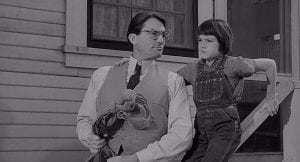 Atticus Finch (Gregory Peck) & Scout (Mary Badham) from the film, To “Kill a Mockingbird”
Atticus Finch (Gregory Peck) & Scout (Mary Badham) from the film, To “Kill a Mockingbird”At one point, in court, Atticus gives us his views on equality:
“But there is one way in this country in which all men are created equal—there is one human institution that makes a pauper the equal of a Rockefeller, the stupid man the equal of an Einstein, and the ignorant man the equal of any college president. That institution, gentlemen, is a court. It can be the Supreme Court of the United States or the humblest J.P. court in the land, or this honorable court which you serve. Our courts have their faults, as does any human institution, but in this country, our courts are the great levelers, and in our courts, all men are created equal.”
Toward the end of the book, Jem and Scout are discussing the idea of family with their Aunt Alexandra.
“What if he was kin to us, Aunty?”
“The fact is that he is not kin to us, but if he were, my answer would be the same.”
“Aunty,” Jem spoke up, “Atticus says you can choose your friends but you sho’ can’t choose your family, an’ they’re still kin to you no matter whether you acknowledge ’em or not, and it makes you look right silly when you don’t.” (p. 210)
To Kill a Mockingbird contains many immutable truths such as these.
To the school boards who feel the need to ban this wonderful book with a multitude of valuable life lessons I would simply say this:
I have read this book a few times and I could find no life lessons that are iniquitous or unsuitable for children to learn, nor have I found any that should be banned from schools. In fact, the handful of life lessons I have shared here are ones that should be taught to all school children. And it wouldn’t hurt for some adults to learn them also.
So why is it being banned in our nation’s schools?
The most common complaint about challenging the book and removing it from school libraries has traditionally been its use of the “N” word. There is also some violent content, a discussion of rape, and references to child abuse—both physical and sexual.
Others complain that the book’s messages about race are outdated and even harmful today. Some see Atticus Finch as a “white savior” figure, and others believe the book’s depiction of racism is flawed because it comes from a white point of view. Others view the book’s depiction of racism as potentially upsetting to young Black readers.
Okay. I get it. But the book is historical fiction and it accurately portrays racism in 1930s Alabama. Those who write historical fiction, as I do, strive for historical accuracy when constructing stories set in the past.
In my books, I have characters in the 19th century using pejorative terms for Mexicans, blacks, and Native Americans. Why? Because that was the way some white Americans referred to minorities in that era. At the same time, those minorities use pejorative words to describe whites.
That’s the way it was in the past. There was a coarseness to life and a lack of sensitivity to others. If you write accurate historical fiction, you cannot hide warts and blemishes of the past with a patina of literary powder and paint.
The racist vernacular aside, To Kill a Mockingbird contains a surfeit of universal truths that those who read it will learn: how to understand those different from ourselves; recognizing that others possess emotions, senses, and feelings just as we do; and that to see another individual’s humanity we must learn to accept and try to understand his or her perspective.
But in today’s divided and polarized nation, we don’t seem to have the time to judge others fairly or respectfully. If you don’t follow the dogma of the PC and cancel culture mob and if your perspective is at odds with theirs, then you run the risk of being banished and “canceled.”
For that very reason, the message in To Kill a Mockingbird is one to which every child and adult should be exposed—to see life from another’s point of view, to “climb in their skin and walk around.”
The surprise in Harper Lee’s book is who, in the end, winds up being the savior. It is not Atticus Finch. It is the reclusive Boo Radley, the shunned, disparaged, and dreaded introvert who Scout and Jem terrorized every summer.
Jem and Scout’s harassment of Boo Radley stemmed from the malicious gossip and insinuation about him in the town. In their eyes, Boo was some kind of monster who ate squirrels raw and who drooled most of the time. From what we learn about Boo, he may well be autistic—which is yet another form of prejudice the book draws attention to.
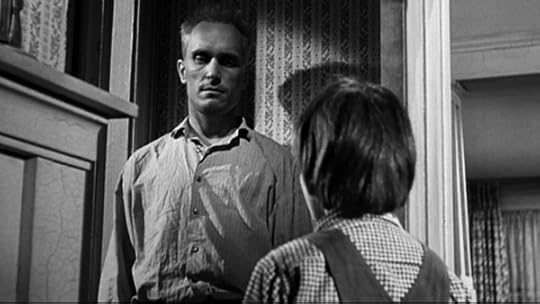 Scout and Boo Radley (Robert Duvall) in To “Kill a Mockingbird”
Scout and Boo Radley (Robert Duvall) in To “Kill a Mockingbird”Ultimately, it is Boo Radley who saves Scout and Jem from being murdered by Bob Ewell, the story’s main antagonist. Ewell, an evil malcontent, serves as a symbol of both prejudice and racism in the book.
It is also Boo Radley who teaches Scout the crucial lesson about perception when, at the book’s end, she stands on his front porch looking at the town of Maycomb from Boo’s viewpoint.
So will someone please tell me why this book is banned in many American schools?
Rather than banning To Kill a Mockingbird it should be required reading from middle school all the way through college. Its lessons are not only important in today’s divided America, they are indispensable and very much needed.
To ascribe 21st-century values and standards to a book set in the 1930s is to deny our history and the struggles Americans of all stripes underwent in coming to grips with racism as well as the societal changes that were beginning to emerge in the South.
To Kill a Mockingbird is not a book that schools and colleges should sweep under the rug of history. Some parts of the story may be uncomfortable, but if we are to understand the past and its inevitable connection to the present, we must not be afraid to face the truth of our history.
Honorable nations do not revise and sanitize their history. They learn from it. We should too.
July 14, 2021
FLASH! FBI Asks Americans to Inform on Family Members and Friends
FLASH! FBI Asks Americans to Inform on Family Members and Friends
What? Can that headline be correct? Regrettably, yes, it’s true!
The Federal Bureau of Investigation is morphing into America’s version of Nazi Germany’s Gestapo.
In a tweet on July 11, the FBI asked Americans to spy on “family members and peers” for signs of “mobilization to violence” and report “suspicious behaviors.”
The reason for denouncing Uncle Harry or Aunt Harriet, let alone mom and dad and one’s brother or sister, is to prevent “extremist activities,” the FBI tweet explained.
So, now the United States really does have a “Big Brother” who is watching our every move, a la “1984.”
It’s called the FBI—Joe Biden’s version of author George Orwell’s “thought police.”
Please don’t take my word for it. Here’s exactly what the FBI said in that tweet:
“Family members and peers are often best positioned to witness signs of mobilization to violence. . . .[and] help prevent homegrown violent extremism. Visit https://go.usa.gov/x6mjf to learn how to spot suspicious behaviors and report them to the #FBI.”
The tweet also included images of “suspicious” individuals accessing computers as well as a link to a government booklet that tells readers how to identify the signs that someone might be considering committing “extremist activities.”
The booklet seems to be telling potential informers to become amateur psychologists with such diagnostic advice as this:
“It is important to consider the totality of circumstances when observing potential indicators, as some factors may increase the risk of extremist violence in a given situation. Some factors include an individual who has an inability to cope with changes or perceived failures in relationships, school, or career.
“A history of violence (e.g., domestic violence or violence toward animals) and unstable mental state; social isolation or inability to join with or relate to others;” and a “possession of, access to, or familiarity with weapons or explosives” should be flagged,” the FBI wrote.
So there you have it, folks. In a previous post, I asked the question: “Are We Nazi Germany?”
[Here is a link that post in case you missed it: https://ronaldyatesbooks.com/2021/06/are-we-nazi-germany/]
I then proceeded to point out the similarities between Nazi Germany and a “woke” America today. I analyzed the Nazi’s use of propaganda, their complete manipulation of all media, the use of thugs to control Germany’s streets, the ban on free speech, the suspension of the public’s right to criticize the government, as well as the arrest and indefinite incarceration of political opponents.
As if those parallels aren’t enough, hundreds of American citizens and protestors who entered the U.S. Capitol building on January 6, 2021, are still being held by the Federal Government in solitary confinement with their habeas corpus rights suspended. Many of these Americans have been behind bars for as long as five and six months without due process and unable to speak to relatives.
Meanwhile, a black Capitol cop who shot and killed an unarmed white U.S. Air force veteran named Ashli Babbitt remains free, unpunished, and protected by the Federal government. The implied connotation of that event is not lost on millions of Americans:
White cop shoots unarmed black man or woman—bad. Black cop shoots unarmed white man or woman—okay.
 Ashli Babbitt
Ashli BabbittThe Gestapo would likely find it a bit sardonic that a Capitol cop in 2021 America can get away with murder in the same way it once did in 1930s Nazi Germany.
Now we have yet another similarity—the government’s insistence that we spy on and turn in friends and family members who we decide are “acting suspiciously.”
Fortunately, some Congress members have pushed back on this new “snitch and lock up” scheme.
For example, Rep. Dan Bishop (R-Texas) has written: “These people (the FBI and intelligence community) protected Hillary, abused NSA surveillance databases against Americans, used known, unreliable DNC-funded propaganda to spy on Trump, perpetuated the Russia hoax, & lied to the FISC repeatedly. And now they tell you that you should spy on your family.”
“In both Cuba & China, they also ask children to spy on their parents,” added Sen. Ted Cruz (R-Texas).
Yes, folks, this is where we are today in Joe Biden’s socialist utopia. Our biggest threat is NOT Iran, Russia, or China.
It’s the American people—especially those Americans who supported and voted for Donald Trump in 2016 and 2020.
More specifically, it is white Americans who, if we are to believe Biden and his leftist and socialist cohorts, apparently are all white supremacists, insurrectionists, and domestic terrorists.
This is not my America, or at least not the one I grew up in and which I agreed to defend with my life as a soldier in the United States Army.
This is an unrecognizable, treacherous place where the government in Washington views the 75 million Americans who voted for and who still support Donald Trump as enemies to be stalked and kept under surveillance.
This is a land where crime is rampant, where dangerous criminals are released without bail to murder, rape, and steal at will, where our borders are open to all who want to cross them, where illegal aliens are put up in hotels at the taxpayers’ expense. At the same time, hundreds of thousands of homeless Americans and military veterans sleep on our streets.
It’s a place where our children are being indoctrinated with Marxist Critical Race Theory disguised as “honest history” so they will grow up hating America and believing if they are white, they are oppressors, and if they are black, brown, red, or yellow, they are the oppressed.
This is an America where our mentally challenged, demented occupant of the White House behaves more like “die Führer” than an American president.
And it’s a place where a complicit Democrat party of fulminating socialists encourages Biden’s relentless socialist conquest of America with tacit cries of “Heil Joe!”
What’s next? Concentration camps? Mass graves? Gas chambers?
July 13, 2021
Some Random Thoughts on America–the Angry, the Miserable, the Suicidal
We hear a lot today about fake news in America. But what about “fake journalists?”
Watch television, cable, or surf the Internet and we see a profusion of talking heads, political pundits, academics, bloggers, and news aggregators out there masquerading as journalists.
Unfortunately, too many people can’t tell the difference between skilled professional journalists and the thousands of journalist “wannabes.”
As a result, confusion reigns.
Who can the public believe in a nation where opinion and the “narrative” masquerade as unbiased and accurate news—an unpardonable journalistic violation that we see more and more often today on network and cable news reports.
Here’s a hint. Whenever you hear an individual who claims to be a journalist say with a straight face that free speech needs to be curbed, that should be the signal for you to switch channels or head for another website.
As a former journalist, freedom of speech and the First Amendment are subjects that I and other authentic journalists feel strongly about—especially when I hear people who claim to be journalists insist that there should be some restrictions on speech. To hear a journalist say something like that is akin to a minister or priest revealing that he or she no longer believes in God.
But the wretched world of journalism, with its fake news and counterfeit journalists, is only a symptom of a nation in moral and ethical decline. We are now a nation that can no longer talk to itself without embarking on a paroxysm of self-flagellation that borders on suicide.
When I left active journalism and became a professor and dean at the University of Illinois, I witnessed disturbing restrictions of free speech on campus in the name of inclusiveness and political correctness. In an ill-advised effort to coddle the habitually offended, “safe spaces” were created where the constantly aggrieved could retreat when they heard a comment they didn’t like or agree with.
In my humble opinion, this is NOT the role of a university. If anything, a university should be a place where ALL ideas can be heard, analyzed, and debated. It should not be a place that censors thought and free expression. Ironically, that’s exactly why the concept of tenure was created. Tenure guaranteed that professors who stated ideas or theories that administrators disagreed with could not be sacked for expressing those ideas and theories.
Sadly, the objective of tenure today has less to do with academic freedom and much more to do with unassailable job security. Too many professors today refuse to allow energetic classroom discussion of ideas they disagree with—a paradoxical twist to the raison d’être of tenure.
Incessant attacks on the Bill of Rights in general and the First & Second Amendments, in particular, should concern every American. These are bedrock freedoms that are the backbone of our Constitution.
Americans tend to take these rights for granted and I fear that only when they have lost them because of a misguided obsession with uniformity of accepted political and social thought will they fully understand the depth of their loss. Of course, then it will be too late.
America will have then become a nation that embraces the failed policies of lock-step socialism, rather than a democratic republic that cherishes personal freedom, free enterprise, and individualism. It is disconcerting for me—a former Democrat—to watch the party I grew up with shift so far to the left that now even mainstream Democrats are calling for America to embrace socialism.
I refused to become a “Social Democrat” and as a result, I vamoosed from that party a couple of decades ago.
Socialism is a failed ideology. It strips people of incentive with its “from each according to his ability, to each according to his need” philosophy. It gives the government too much control over the lives of its citizens. If you want to live in George Orwell’s “1984” or Aldous Huxley’s “Brave New World,” then, by all means, embrace socialism. I hope I’m not around to witness the destruction of the country I love and that I served as a soldier.
Today, in America, many people are too quick to condemn opinions and attitudes they disagree with as “hate speech.” In fact, the American Civil Liberties Union says there is no such thing as hate speech—there is only free speech. I don’t always agree with the ACLU, but in this instance, they are correct. The remedy for dealing with so-called hate speech is more free speech. Yet, all we hear today in America is the vicious vilification of those who disagree with us.
Unfounded allegations of racism, bigotry, hate speech, etc. have taken the place of rational discourse and dialog. The result is a nation in which reasonable and cogent debate on such issues as free speech, gun control, illegal immigration, racial equality, border security, etc. is thwarted by biased and impenetrable minds that are bolted shut.
I hate to sound so pessimistic but given the state of intolerance and ill-advised identity politics that is embracing and suffocating our nation today, I am not optimistic about the future. We are currently gripped in the most ominous cycle of malicious personal attacks and malevolent political destruction I have ever seen.
Some call it “cancel culture.” I call it “tyranny and despotism.” I have seen both in my travels during a 28-year-long career as a foreign correspondent. I have visited political prisoners in former and current dictatorships. I have seen thousands of protestors murdered in Communist China for daring to oppose the ruling Chinese Communist Party.
And in the United States, I have heard Senators and members of the House of Representatives refer to those who oppose the ruling Democrat Party insurrectionists, domestic terrorists, and white supremacists. Some politicians have even called for putting Republicans into “re-education camps” and taking away their children so they can be indoctrinated with “correct political thought.”
Thank God, we have not yet reached the point where political opponents are jailed indefinitely for their political and social beliefs. Or have we?
As I recall after six months several hundred people are still languishing in various prisons for breaking and entering the U.S. Capitol Building on January 6, 2021–and most have yet to be charged or prosecuted.
How can this happen in the United States? You only have to look back to 2006 to see how. In the final hours before adjourning in 2006, Congress passed and the president signed the Military Commissions Act (MCA). In doing so they cast aside the Constitution and the principle of habeas corpus, which protects against unlawful and indefinite imprisonment.
Essentially, the MCA completely eliminates the constitutional due process right of habeas corpus for detainees at Guantánamo Bay and elsewhere–including those federal facilities where many of the January 6 protestors are being held. It allows our government to continue to hold hundreds of prisoners for more than five years without charges, with no end in sight.
Does this sound like the America where you are innocent until proven guilty and where you are entitled to a fair and speedy trial?
Our nation’s founders considered habeas corpus essential to our basic rights and enshrined it in the Constitution. Article I, Section 9 of the Constitution states, “The privilege of the Writ of Habeas Corpus shall not be suspended, unless when in Cases of Rebellion or Invasion the public Safety may require it.”
Calling what happened on January 6 in the U.S. Capitol a “rebellion” is a stretch. I would call the rioting, looting, burning, and attacking of government buildings last summer in cities like Minneapolis, Seattle, New York, and Portland more of a rebellion than the unarmed protestors who unlawfully entered the Capitol Building.
In all cases, you had mobs of angry people convinced they had a right to do what they did. Why then, did the full force of American law come down only on those who invaded the Capitol and not those who held entire city blocks in Seattle and Portland hostage? Why aren’t members of Black Lives Matter and Antifa sitting behind bars?
Because, like the “brown shirts” of Nazi Germany in the 1920s and 1930s, BLM and Antifa are the street fighters of the Democrat Party. They attack and beat political opponents without legal consequence, just as the brown-shirted “Sturmabteilung” (S.A.) did in Nazi Germany.
We are living in an era of extreme political polarization, where your social and political beliefs can be a reason for the termination from a job, for losing friends, and even being expelled from your own family.
Whatever happened to “we can agree to disagree” while we examine one another’s arguments? Instead, those on the other side of an argument are branded bigots, racists, sexists, fanatics, zealots, jingoists, and even criminals.
When you have elected officials calling for the incarceration and even the assassination of political opponents, as a Democrat state senator from Missouri did recently, it tells me our tradition of a loyal opposition is in grave danger.
When we as Americans refuse to listen to opposing ideas or views, I fear our parochialism and narrow-mindedness will drive us down the slippery slope toward annihilation and that will herald the end of one of human-kinds most noble experiments in self-governance and individual freedom.
At that point, the torch America’s iconic Statue of Liberty has held in her right hand since 1886 will be extinguished and the world will have re-entered a new Dark Age.
When that happens, God help us all.
Of course, given our nation’s rampant secularism and its government-approved rejection of the sanctity of life, I suspect pleas for God’s help will go unheeded.
After all, as the Bible says: You shall reap what you sow.

